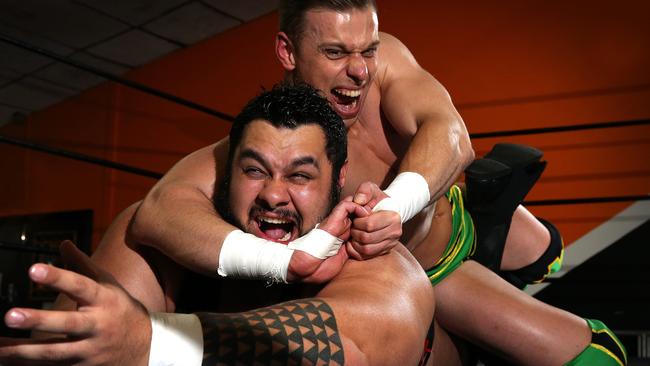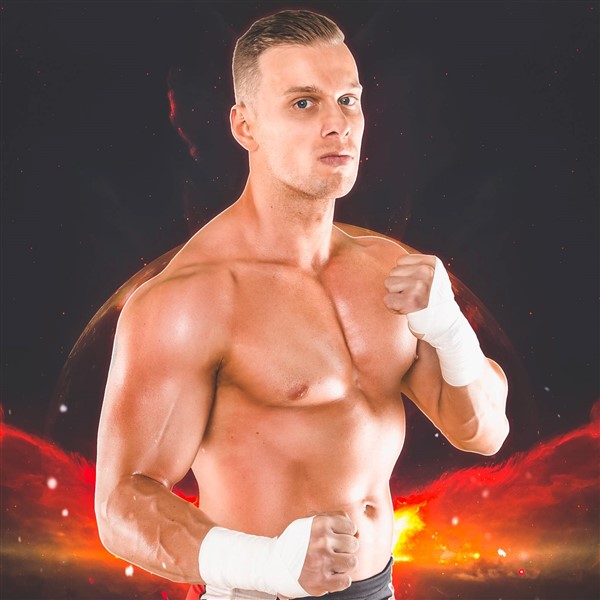What Does It Take To Become A Pro Wrestler? – Damian Slater

THE ORIGIN STORY OF A PROFESSIONAL WRESTLER By: Damian Slater
What does it take to become a Professional Wrestler?
For the who frequent my YouTube channel (WorldBeaterWrestling.com) you would have seen that I am regularly answering questions and creating videos on the topic of preparation for the ring. This will make it seem like a cop out when I say that my answer is often some variation of Antonio Inoki’s legendary [paraphrased] quote – ‘take one step, for it will start a road and it will become the road.’
What ends the Pro Wrestling dream for far too many is an unwillingness to even commit to the all-important steps of finding a school, signing up and showing up. In my 20 years, I would guess that roughly 20% of those who attend Open Days or Tryouts, ever come back. Maybe 10% continue after the first few months. Maybe 5% eventually become ‘Professional Wrestlers’ for a hot minute. Far less stick with it for the long haul. And I’m being incredibly generous with these numbers.
The truth is that while having an athletic background and basic understanding of Pro Wrestling can help, nothing sufficiently prepares you for what we do. No quantity of conditioning work will get you in ring shape. You just have to get in the ring, weather the storm and your progress will come with repetition and consistency. Please don’t mistake this as a suggestion that anybody can do it or that we all enter on an even playing field. The physical and mental toll that Pro Wrestling takes on a human being is difficult at the best of times. Zero preparation and showing up in awful shape will almost certainly result in a highly disheartening experience for you.
However, this usual vague response of “just do it!” doesn’t make for an exciting piece of writing, so allow me to extend upon my answer.
There are definitely methods of preparation that I would recommend which will give you more of a fighting chance of having a fulfilling journey in the game. The biggest indicator of success in my experience, is someone who has played some sort of contact sport in their youth whilst also being savvy enough in their Pro Wrestling fandom to pick up on a lot of the nuances of the art form, such as the way to move and how to be expressive with both voice and body.
Where to start if you don’t tick these boxes? For me, I’d be looking at martial art forms, particularly any that are grappling focused – Brazilian Jiu Jitsu, Freestyle Wrestling, Catch/Submission Wrestling, Judo etc. In fact, I’d recommend even current Pros spend some of their free time practicing martial arts unless you are lucky enough to train in a place that teaches it within their Pro Wrestling curriculum. Sadly, it’s few and far between nowadays. Grappling teaches very similar footwork, movement, pacing and conditioning to Pro Wrestling and I generally see practitioners make huge progress in the early stages when they make the jump to the squared circle.
Secondary to this, I’d be looking at taking on some form of strength and conditioning protocol. Again, this is something every Pro Wrestler should be involved in, to complement their in-ring training. I will add the caveat that there is no perfect way to train in the gym. Hypertrophy (body building), Power Lifting, HIIT — they all have some crossover effect to Pro Wrestling however only in a very limited capacity.
I’m only scratching the surface of the physical side but wouldn’t be doing this article or myself justice as a trainer without mentioning the mental side. Professional Wrestling is difficult. It hurts. It’s frustrating. It’s competitive. You regularly question whether it’s worth living in pain for a few fleeting moments of glory or if that glory will even come at all. This is not your Sunday amateur footy side where even if you can’t kick a ball you could probably get a game somewhere. Most rookies who come out of reputable schools can take a year or many, before they are ever allowed to appear in front of a live audience. When you combine the physical demands, with the psychological knowhow to execute a well-structured match that engages the audience… plus the character side… and the aesthetics… and there only being so many spots on a card… it often takes a mammoth effort and a modicum of luck to even make it to the big stage. It’s a marathon, not a sprint, and you need to be prepared to be a player in the war of attrition or else you could burn out before your entrance music ever hits.
I strongly believe that you get out what you put in, especially when it comes to Pro Wrestling. If you’re willing to put in the hard yards, even when nobody’s looking, the eventual rewards make it all worth it. It’s not a life for everybody but if you train under the right mentors, show gratitude and enjoy the learning process, it could be a life for you.


‘World Beater’ Damian Slater




